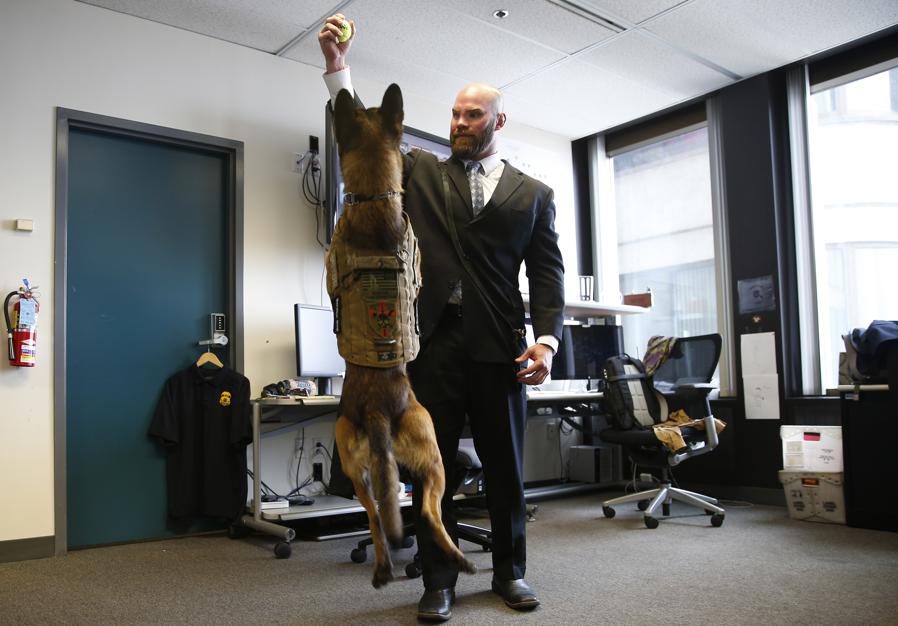



Three years after he lost his right eye and was badly injured in a suicide bombing attack while searching for insurgents in Afghanistan, Sergeant Thomas Block now has a new mission: rescuing children from child predators.
The Human Exploitation Rescue Operative, also known as the HERO program, designed for ill and wounded special operations veterans, offered Block the opportunity to receive computer forensics training, learn law enforcement skills, and assist federal agents in the war against online child sexual exploitation.
Participants learn about the breadth of child exploitation, its impact, and strategies investigators use to locate offenders.
After 11 weeks of training, Block started a 10-week long internship with the Child Exploitation Investigations and Cyber Crimes Unit in Boston in April as a forensic analyst. He sifts through explicit messages exchanged between pedophiles, and disturbing images and videos of children forced to commit sexual acts. Block is the first HERO participant to join the Boston office.
Block said he became an Army Ranger because it was a “purpose driven job’’ and he was able to save lives.
“You went after the bad guys [and] made the world a safer place with every action you did,’’ he said. “[The HERO program] is the next thing I can do. I can be part of something bigger than myself. ’’
The initiative created three years ago by the US Immigration and Customs Enforcement’s Homeland Security Investigations, the US Special Operations Command, and the National Association to Protect Children gives injured veterans like Block an opportunity they may not have otherwise had.
Block joined the Army when he was 23 and for a long while it was all he knew.
On Oct. 5, 2013, he was on a combat mission with the Third Battalion, 75th Ranger Regiment searching for insurgents who were planning attacks in Afghanistan, he said.
He and his team stumbled upon a man and a woman in a courtyard.
Block said he ordered the two people to walk toward him. After the man reached him, the woman jumped up and detonated a bomb that had been attached to a vest she was wearing, Block said.
He used the man as a shield, but the blast threw him 30 feet and into a ditch.
Four Rangers died that night trying to reach Block when they walked onto a land mine and more than two dozen were injured.
Block had multiple surgeries to rebuild parts of his face; and he replaced his right eye with a Captain America shield. He was declared legally blind. His Army career was over.
“That was one thing I was afraid of . . . what am I gonna do outside of the Army,’’ Block said.
When the 29-year-old resident of Woburn learned about the HERO program, he said, he immediately knew it was something he wanted to be apart of.
Since its inception, 84 veterans graduated from the HERO program and participated in interships at ICE offices, according to agency spokesman Shawn Neudauer.
The internships are unpaid. So far 40 program participants have been hired by ICE and one was hired by the National Association to Protect Children.
Members of the Child Exploitation Investigations and Cyber Crimes Unit in Boston said having Block on their team has been a plus.
“It’s a win-win,’’ said Rick Sabatini, the unit supervisor and special agent. “He was used to hunting down and going after the bad guys . . . he’s still hunting the bad guys and now doing it for the benefit of children.’’
Inside the Boston Cyber Forensic Lab, images flashed across the screen: A photo of a 2-year-old girl and a man standing before her with his genitals just inches away from her open mouth. Then there was the photo of the naked toddlers squatting; one child was not even a year old, an agent said. And another girl with red hair, who was rescued from her abuser two months ago, was photographed performing oral sex on a man.
Federal investigators in Boston said the youngest victim they’ve encountered was just 10 days old. A majority of child pornography includes youngsters between the ages of 2 and 8, said Special Agent Pete Manning. Those photos and more are traded like baseball cards among pedophiles.
The unit investigates all types of cyber crimes, but 90 percent of the cases are related to child exploitation.
In the last six months, agents in Boston rescued 20 children and arrested a dozen child predators including Derrick Jones, 45, of Arlington, who pleaded guilty in January to receipt and possession of child pornography. Jones was sentenced to 15 years in prison followed by 10 years of supervised release, and will be required to register as a sex offender.
To crack the case, digital forensic analysts look for anything in the photos and videos that might provide a clue as to the child’s whereabouts.
“In a sense you almost got to think like these guys and look for the underlying things that they might have forgotten,’’ Block said.
Though just several weeks into the internship, Block hopes to save as many children as he can.
“These people that take these pictures or these videos, condition these children to make them think it’s normal and it’s not,’’ Block said. “The things that they do to them are horrible. Seeing those pictures provides the drive to catch these guys.’’
Jan Ransom can be reached at jan.ransom@globe.com. Follow her on Twitter at @Jan_Ransom.



